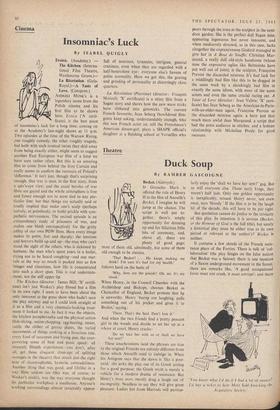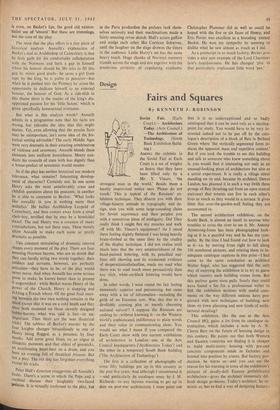Theatre
Duck Soup
By BAMBER GASCOIGNE Becket. (Aldwych.) IF Grouch° Marx is offered the role of Henry II in the film of Anouilh's Becket, I imagine he will jump at the chance. The script is well put to- gether, there's ample opportunity for dressing up and for hilarious little bits of ceremony, and, above all, there are plenty of good gags; most of them old, admittedly, but some of them old enough to be classics.
'That Becket! . . . He keeps making me think! I'm sure it's bad for my health.' follows hard on the heels of 'Why, here are the guards! Oh, no, it's my snack.'
When Henry, in the Council Chamber with the Archbishop and Bishops, chooses Becket as Chancellor of England, Becket protests that he is unworthy. Henry 'bursts out laughing, pulls something out of his pocket and gives it to Becket,' saying: 'There. That's the Seal. Don't lose it.'
And when the two friends find a 'pretty peasant girl in the woods and decide to set her up as a whore at court, Henry cracks:
'Do we take her with us or shall we have her sent?'
These anachronisms (and the phrases are true to the original French) are entirely different from those which Anouilh used to indulge in. When his Antigone says that the dawn is 'like a post- card,' she jerks the play out of its Greek setting for a goad purpose; the Greek myth is merely a vehicle for a modern drama of resistance. But Henry's bons toots merely drag a laugh out of incongruity. Needless to say they will give great pleasure. Ladies hot from Harrods will partici,- larly enjoy the 'shall we have her sent?' gag. But so will everyone else. Those early, kings, they weren't half lads. Only one golden opportunity is inexplicably, missed. Henry never, not even once, says 'bloody.' If the film is to be the laugh hit.of the decade, this will have to be put right.
But quotation cannot do justice to the triviality of this play. In intention it is serious (Becket, or the Honour of God is the full title), but surely a historical play must be either true to its own period or relevant to the author's? Becket is neither.
It contains a few shreds of the French resis- tance plays of the Forties. There is talk of 'col- laboration' (the play hinges on the false notion that Becket was a Saxon); there is one mention of a Saxon underground movement in the forest; there are remarks like, 'A good occupational force must not crush, it must corrupt': and there 'You know What I'd do if I had a lot of atones? I'd bay a ticket to hear Mort Sald knocking the. Acquisitive Society.' is even, on Becket's lips, the good old existen- tialist use of 'absurd.' But these are trimmings, not the core of the play.
The most that the play offers is a tiny piece of historical analysis Anouilh's explanation of Becket's zeal as Archbishop of Canterbury is that he feels guilt for his comfortable collaboration With the Normans and feels a gap in himself where his honour should be. He tries to fill this gap by minor good deeds--he saves a girl from rape by the king, he is polite to peasants—but when he is pushed into the Primacy he seizes the opportunity to dedicate himself to an external honour, the honour of God. As a side-dish to this theme there is the matter of the king's dis- appointed passion for his 'little Saxon,' which is given specifically homosexual overtones But what is this analysis worth? ,Anouilh admits in a pfogramme note that his facts are wrong, but ridicules the idea that this, might matter. Yet, even allowing that the precise facts may be unimportant, isn't some idea of the his- torical setting advisable? The early Middle Ages Were very dramatic in their amazing combination of violence and ceremony. Anouilh blends these elements into uniform boorishness. Henry con- ducts his councils of state with less dignity than a house-prefect of seventeen would muster.
So if the play has neither historical nor modern relevance, what remains? Interesting develop- ment of character? Certainly not. In one scene Henry asks the most unbelievably crass and Childish questions about his peasants; in another he is able to comment to Becket: 'What looks like morality in you is nothing more than esthetics,' He bullies Archbishop Leopold of Canterbury, and then cowers away from a small choir-boy, terrified that he may be a homicidal dwarf. The real Henry was a creature of many contradictions, but not these ones. These merely allow Anouilh to make each scene as spicily dramatic as possible.
This constant stimulating of dramatic interest shapes every moment of the play. There are four amusing Norman barons, who are so dumb that they can hardly string two words together; their soldiers and servants, however, are perfectly articulate—they have to be, or the play would never move. And when Anouilh has some serious Point to make, he knows better than to present It ungarnished: while Becket warns Henry of the Power of the Church, Henry is slapping and tickling a French whore. Of the great final meet- ing between the two men nothing remains in the mind except that it was on a cold heath and they were both mounted on those cleverly designed hobby-horses;. what was said is lost—or un- important. Then there are the neat theatrical tricks. The tableau of Becket's murder by the four knights changes miraculously to one of Henry being flogged, as a penance, by four Monks. Add some great blasts on an organ at climactic moments and that oldest of gimmicks, an accelerating heart-beat on a drum, and you have an evening full of theatrical frissons. But not a play. The old dog has forgotten everything except his tricks.
Peter Hall's direction exaggerates all Anouilh's faults. There's a scene in which the Pope and a cardinal discuss their laughably two-faced Policies. It is virtually irrelevant to the play, but in the Paris production the prelates took them- selves seriously and their machinations made a fairly amusing revue sketch. Hall's actors guffaw and nudge each other like Corsican fishwives, until the laughter on the stage drowns the titters in the audience. Leslie Hurry's set has the same heavy touch. Huge chunks of Norman masonry trundle across the stage and slot together with the ponderous certainty of copulating elephants. Christopher Plummer did as well as could be hoped with the five or six faces of Henry, and Eric Porter was excellent as a brooding uneasy Becket. He won my sympathy by seeming to dislike what he saw almost as much as I did.
As a postscript to so much foolery, Becket pro- vides a nice new example of the Lord Chamber- lain's fastidiousness. He has changed 'piss' to that particularly unpleasant little word 'pee.'



















































 Previous page
Previous page